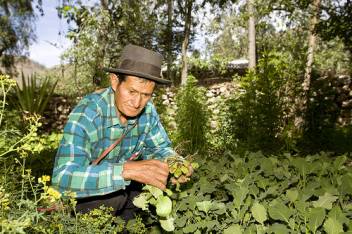 For over a year, the HelpAge global network has been engaged in the process to establish a new development framework to follow on from the Millennium Development Goals (MDGs): The post-2015 process.
For over a year, the HelpAge global network has been engaged in the process to establish a new development framework to follow on from the Millennium Development Goals (MDGs): The post-2015 process.
With our most recent discussion paper, “Building a future for all ages”, we want to invite you to join the conversation and discuss how we can create an age-inclusive and rights-based post-2015 development framework – a future for us all.
To further develop our ideas we would like to encourage everyone interested to read the discussion paper and send your thoughts to me at ahylander@helpage.org.
Why is a future for all ages so important?
Ban Ki-moon, UN Secretary-General, commented in our joint report with UNFPA, Ageing in the 21st Century: “As the international community embarks on an effort to articulate the post-2015 development agenda, it is clear that the issue of population ageing should be fully addressed as part of this process.”
We are very happy that the challenges of global population ageing are being recognised. By 2030, there will be more people over 60 than children under 10; and 73% of the world’s older population will be living in developing countries. A new development framework needs to address this unprecedented demographic transition.
We are also extremely pleased that the issue of human rights is coming into the discussion, as we believe that the new framework must have at its foundations a strong human rights basis that delivers rights to all people across the entire life course.
HelpAge therefore suggests that what comes after the MDGs should respond to all stages of the life course, including of course older age. We would like to see a future framework that is based on explicit human rights standards and that:
- promotes both life expectancy and healthy life expectancy as key measures of human development
- ensures access to income for people of all ages through the adoption of a social protection floor, guaranteeing access to work and livelihood opportunities
- builds the resilience to natural disasters of people of all ages through national and community risk management systems
- ensures fair progress of the post-2015 development agenda through the inclusion of sex and age-disaggregated data in measuring future indicators.
We recognise the importance of the indicators that will be used to measure any kind of future framework and suggest that all indicators must be able to measure how broader goals and targets are achieved for people throughout the life course. Any goals and targets that address the whole population should therefore be measured by age- and sex-disaggregated indicators.
If you want to read more about these recommendations please see our discussion paper and do feel free to send us your feedback either via email or by commenting on this blog post.
What can you do to promote a future for all ages?
If you agree with or are interested in these recommendations, there are several ways you can get involved with the post-2015 process both off and online:
Offline, the UN and civil society organisations will be organising up to 100 national consultations over the coming months. These national consultations are intended to foster an inclusive process and advocate for a post-2015 development agenda informed by national and local priorities.
National stakeholders will come together to exchange ideas for a shared future framework in an open debate with relevant knowledge on development challenges, opportunities and solutions.
If you or your organisation is interested in engaging with the national consultations you can get in touch with your national UN focal point and ask to be invited to the consultation. You can find contact information for the focal points here.
Online, the World We Want website is up and running. The World We Want will gather people’s feedback and input from around the world and work to build a vision that will be used by the UN and world leaders to plan the next development framework.
After setting up your log-in details on the World We Want website, you can participate in all the discussions on various thematic areas, including population dynamics. Feel free to use HelpAge’s messages in any of the discussions.
Further actions:
- Download our “Building a future for all ages” discussion paper and let us your feedback.
- Read more about our work on the post-2015 process.
